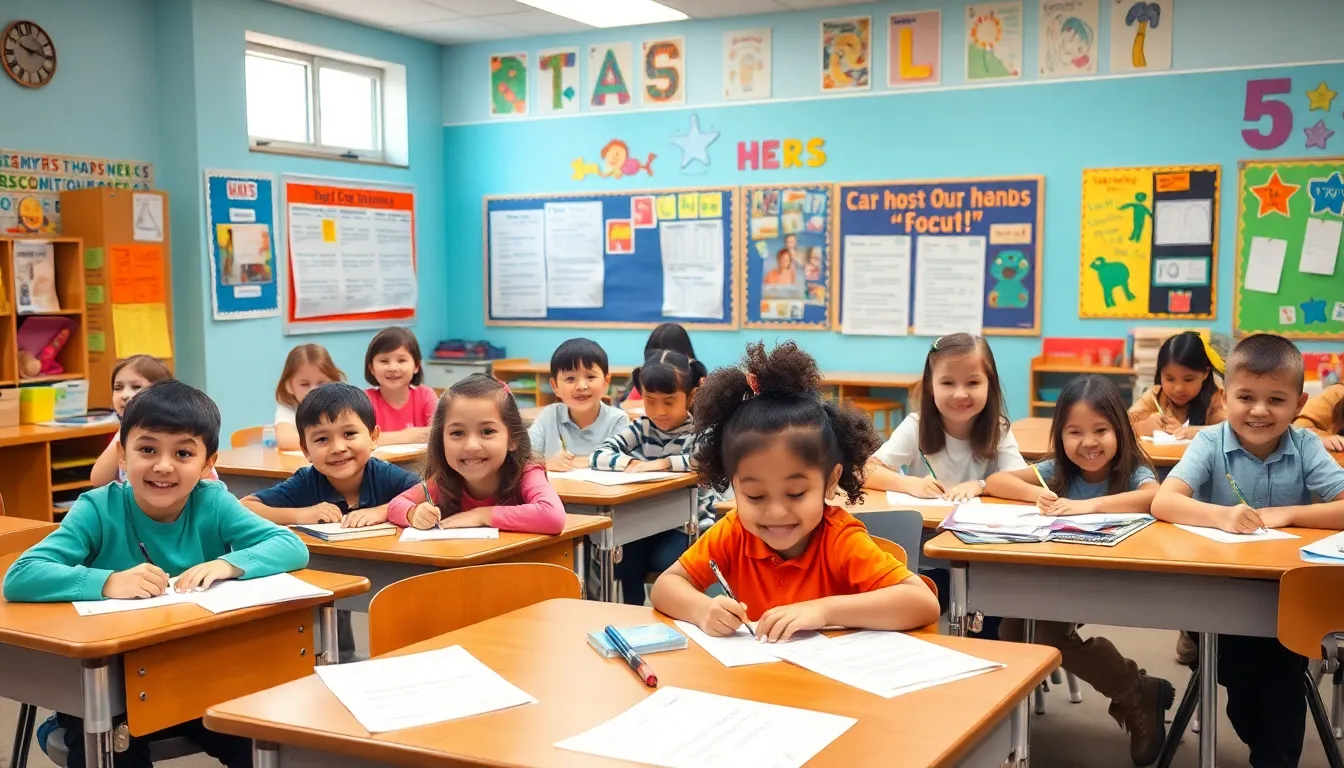Table of Contents
ToggleIn the world of third graders, opinions can be as colorful as their crayon boxes. Every child has a unique perspective just waiting to burst onto the page. Opinion writing isn’t just an assignment; it’s a chance for kids to flex their creative muscles and share their thoughts on everything from pizza toppings to the best superhero.
Understanding Opinion Writing
Opinion writing allows third graders to express their thoughts and perspectives creatively. This form of writing enables children to articulate their preferences and opinions on various engaging topics.
What Is Opinion Writing?
Opinion writing involves stating a personal belief and supporting it with reasons. A child may choose a topic like favorite dessert selections and explain why they prefer chocolate over vanilla. This writing encourages critical thinking and structured expression through clear arguments and examples. Providing logical explanations helps readers understand the child’s point of view. Opinion writing also fosters individuality by allowing each child to voice unique thoughts and ideas.
Importance of Opinion Writing in 3rd Grade
Opinion writing holds significant importance for third graders. It cultivates essential communication skills, which are crucial for academic success. Engaging with different topics sharpens their analytical skills, enabling them to assess various viewpoints. Additionally, opinion writing promotes self-confidence, as children learn to share their thoughts with conviction. Writing projects that involve personal opinions encourage exploration, helping students to connect with their preferences and interests. Overall, this form of writing lays a foundation for effective communication in future writing endeavors.
Key Features of Effective Prompts


Effective opinion writing prompts possess certain key characteristics that enhance student engagement and learning. Focusing on clarity and simplicity ensures that third graders can easily understand what is being asked of them.
Clarity and Simplicity
Clarity plays a crucial role in effective prompts. Straightforward language aids comprehension, allowing students to grasp the task with ease. Prompts should avoid complex vocabulary, which might confuse young writers. Simple, clear instructions foster confidence, encouraging students to express their thoughts freely. For instance, using “What is your favorite book and why?” allows for a clear response, minimizing ambiguity. Simple constructions help maintain focus, guiding students toward the core of their opinions.
Engagement and Relevance
Engaging prompts relate directly to students’ interests. Relevant topics capture their attention, prompting enthusiastic responses. When kids connect personally with the subject, they feel motivated to share their opinions. Incorporating themes like favorite hobbies or recent experiences makes writing more inviting. By considering students’ perspectives, educators can create a rich dialogue about their thoughts. For example, asking “Which superhero do you admire most and why?” sparks excitement and meaningful engagement. Effective prompts stimulate discussion and inspire children to express themselves clearly.
List of Opinion Writing Prompts for 3rd Grade
Opinion writing allows third graders to express their thoughts on diverse topics. Below are prompts that cater to their creativity and insights.
Fun and Creative Prompts
- Choose your favorite ice cream flavor and explain why it’s the best.
- If you could be any animal for a day, which one would it be and why?
- Identify the best movie you’ve seen this year. Describe what makes it special.
- Share your favorite season and provide reasons for your choice.
- Discuss whether video games are beneficial or harmful. Support your opinion with examples.
Real-World Issues Prompts
- State your thoughts on whether school days should be shorter. Include reasons for your stance.
- Express your view on recycling in your community. Why is it important?
- Discuss if pets should be allowed in school. What impact would they have on students?
- Share whether you think kids should have a say in what food is served at school lunches.
- Explain your opinion on wearing uniforms to school. How does it affect students?
Tips for Teachers
Supporting third graders in opinion writing requires thoughtful strategies. Engaging students during this process maximizes their expression and understanding.
Encouraging Student Expression
Create an environment conducive to sharing thoughts. Allow students to brainstorm ideas in small groups, fostering a collaborative atmosphere. Encourage them to explore diverse topics, such as superheroes or favorite hobbies, ensuring relevance to their lives. Use visual aids to stimulate discussion and help students articulate opinions more easily. Provide sentence starters or graphic organizers to guide their writing. Incorporate discussions that emphasize respect for differing perspectives, fostering a sense of community. Celebrate diverse opinions as students present their thoughts to the class, reinforcing the value of strong communication skills.
Assessment Strategies
Implement various assessment methods to gauge understanding. Use rubrics that highlight key elements of opinion writing, such as clarity, reasoning, and examples. Peer review sessions offer students the opportunity to engage with each other’s work while enhancing critical thinking skills. Provide constructive feedback focused on strengths and areas for improvement. Encourage self-assessment by having students reflect on their writing process and outcomes. Regular check-ins during the writing process can clarify expectations and guide revisions. Combine these strategies to support student growth and showcase progress in opinion writing.
Opinion writing for third graders serves as a vital tool for developing essential communication skills. By engaging with prompts that resonate with their interests, children can express their thoughts and beliefs confidently. This form of writing not only nurtures creativity but also enhances critical thinking and reasoning abilities.
Educators play a crucial role in fostering an environment where students feel empowered to share their unique perspectives. By implementing effective strategies and supportive assessments, teachers can help students refine their writing skills. Ultimately, opinion writing lays the groundwork for future success in communication and self-expression, encouraging young learners to embrace their individuality.







